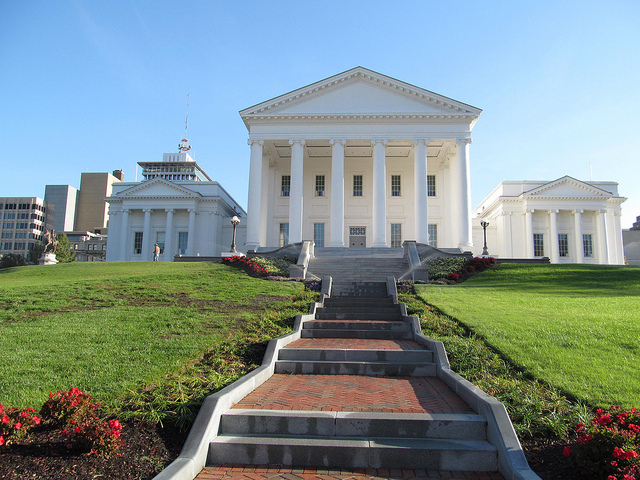January 11, 2017
5 Big Political Stories To Watch In Richmond In 2017

The Virginia State Capitol building
Lawmakers from across the Commonwealth of Virginia are back in Richmond today to convene the 2017 legislative session. On Tuesday, The Kojo Nnamdi Show explored the big stories to watch as things get going. Guests Jeff Schapiro and Rachel Bitecofer explained that lawmakers will be considering a number of proposals, though much of what gets done may have more to do with political positioning than anything else.
Here are the top five politics stories watch:
1. 2017 is a big election year
Gov. Terry McAuliffe is finishing his term this year, and because of a law banning consecutive terms for governors, candidates on both the Democratic and Republican sides are already jockeying for the role. Furthermore, all 100 seats of the Virginia House of Delegates are up for election. “I think Governor McAuliffe is acutely aware that what he will be doing in this session will be shoring up his legacy and also preparing the party for the next statewide slate of elections, trying to give them the best leg up that they can going into that statewide election,” Rachel Bitecofer, Assistant Director of the Wason Center for Politics and Public Policy, said on The Kojo Nnamdi Show.
Richmond Times-Dispatch columnist Jeff Schapiro agreed. “In an election year, politicians can be on their best if not worst behavior,” he said. “Best in that they don’t want to be seen as needlessly contentious, worst in that they often introduce a lot of bills that aren’t going anywhere but that they can reference to constituents and voters when they return to their districts in anticipation of the election.”
2. Controversial proposals are unlikely to pass
Some highly controversial proposals have already grabbed the attention of the media and activists, including proposed legislation from Del. Dave LaRock (R-Loudoun) that would ban abortions after 20 weeks of pregnancy. Another measure, introduced by Del. Bob Marshall (R-Prince William County), is similar to North Carolina’s well-known “bathroom bill” and would ban people from entering government building bathrooms of genders different than the one on their birth certificates. Were they to pass in the General Assembly, McAuliffe has already promised to veto both bills.
“The sense that I get talking to people in Richmond is this is dead on arrival, it will never make it out of the committee,” Bitecofer said on the bathroom bill. “I think it will get a lot of attention from the media because it is a controversial issue and it does incite passion on both sides, but I don’t expect it will get a lot of oxygen once the assembly meets.”
3. Budget, budget, budget
Lawmakers will likely spend much of the session debating how to deal with a $1.26 billion budget shortfall from 2016 through 2018. “It being an election year…the impulse to raise taxes will be minimal to non-existent, plus with a Republican-controlled legislature the hostility for new taxation is fairly acute,” Schapiro said. “So look to the assembly to balance the budget with spending cuts.”
One topic up for debate will be state workers’ pay. McAuliffe’s proposed budget includes a one-time 1.5 percent bonus for state employees, a downgrade from the raises he says he was forced to cancel. His budget, which needs to be approved by the General Assembly, also includes a five percent cut to higher education. The General Assembly already plans to submit its own budget to the governor. Again, election year politics will come into play. “Legislators will be looking to mitigate risk and…there’s no harder re-election to go into than when you’re cutting from the budget,” Bitecofer said.
4. The will for mental health reform
One area where bipartisan action is likely is mental health reform. Mcauliffe’s budget proposal includes $31.7 million in new spending for the state’s mental health services and substance abuse treatment programs. A legislative commission has submitted a package of mental health reform bills to be considered during the 2017 session, including a bill that would make it easier for mentally ill people to be moved from jails to treatment facilities, and one that would make treatment services more even across the state. Still, Bitecofer warns that budgetary constraints may stymie attempts at reform. “It’s important to point out that there’s a lot of political moral good will to deal with mental health issues, but really where the rubber meets the road is funding,” she said.
5. A potential Supreme Court wildcard
Late last year, the U.S. Supreme Court heard arguments over whether Virginia’s districts were drawn in a way that intentionally dilutes the influence of minority voters. The Kojo Nnamdi Show discussed that court case in January of 2016. Schapiro predicts that the Court, mindful of the coming election, will make a decision quickly. “If the Supreme Court were to throw out that plan and all twelve [contested] districts, that would clearly force the General Assembly to redraw the map in an election year,” he said. “That’s a pretty tricky task and it will be made even trickier with a federal court looking over its shoulder.”
Want more? Listen to the whole show with Rachel Bitecofer and Jeff Schapiro:
In 2017, Virginia Debates Abortion Timelines And Cutting State Spending – The Kojo Nnamdi Show


